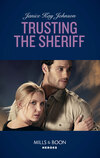Loe raamatut: «Yesterday's Gone»
Tomorrow’s a new beginning...
When a digitally aged photo of a girl named Hope Lawson is posted online, Bailey Smith can’t deny the similarity to herself. But could she really be the same woman who was abducted as a child twenty-three years ago?
When she meets Detective Seth Chandler, who opened the cold case of Hope’s disappearance, suddenly everything changes. Not only does Bailey have a family she barely remembers—and a sister she’s never met—she’s connecting with a man for the first time. A man who’s loving and gentle. But Bailey’s not sure she’s ready to be found: by him or the parents she once lost.
Detective Chandler’s expression never changed.
But Bailey wasn’t surprised that his pupils had dilated when he finally lifted his head. They stared at each other, and she thought, Don’t let him want me. It would be incredibly unrewarding for him. Men...well...she didn’t do men. Not anymore.
When she looked at him again, his crooked smile sent a jolt through her.
“It’s a pleasure to meet you, Hope Lawson,” he said.
“Just...don’t call me that.”
“All right.” There was that astonishing gentleness again. “Bailey it is. Unless you prefer Ms. Smith?”
“Either is fine.” She retreated to her side of the table. “Thank you, Detective.”
“If you’re going to be Bailey, I’ll be Seth.”
The flutter in her belly wouldn’t let her respond to that. We’re not friends, she wanted to say, but she didn’t want to alienate him, either.
This desire to cling to him was completely unfamiliar to her.
Dear Reader,
You see the articles about girls or women rescued after being held captive for months or years. There’ll be occasional follow-ups that include photos in which she is now stylish and remarkably poised.
Studying them, you’d never guess what she endured. But on the inside, I doubt she is anywhere near as together as she appears. I can imagine many excellent reasons for her to develop a facade to hide the damage she still feels.
But as I contemplated this story idea, I started thinking about an adoptive sister who was always aware her role was to substitute for the “real” daughter who had been abducted and was still mourned by their mutual parents. And what about Hope Lawson, who finds her way home after twenty-three years to discover her parents replaced her with another little girl, whom she is now supposed to call sister?
What a cauldron of family conflict on top of deep emotional scarring!
The heroes? Not hard to figure out for each of these sisters what man would both draw and threaten her on an emotional level.
Minor confession: sometimes I’m a little ashamed of myself, being intrigued by such painful experiences. I mean—romance writer here.
But I tell myself a love story isn’t really about the romantic stuff, it’s about the terror of making an awful mistake, about being hurt and healed and ultimately believing in another person.
I hope you find Hope aka Bailey’s miraculous homecoming moving, and will be on board for Eve’s story in my October Superromance, In Hope’s Shadow.
Janice
Yesterday’s Gone
Janice Kay Johnson

An author of more than eighty books for children and adults, USA TODAY bestselling author JANICE KAY JOHNSON is especially well-known for her Mills & Boon Superromance novels about love and family, about the way generations connect and the power our earliest experiences have on us throughout life. Her 2007 novel Snowbound won a RITA® Award from Romance Writers of America for Best Contemporary Series Romance. A former librarian, Janice raised two daughters in a small rural town north of Seattle, Washington. She loves to read and is an active volunteer and board member for Purrfect Pals, a no-kill cat shelter. Visit her online at janicekayjohnson.com.
MILLS & BOON
Before you start reading, why not sign up?
Thank you for downloading this Mills & Boon book. If you want to hear about exclusive discounts, special offers and competitions, sign up to our email newsletter today!
Or simply visit
Mills & Boon emails are completely free to receive and you can unsubscribe at any time via the link in any email we send you.
Contents
Cover
Back Cover Text
Introduction
Dear Reader
Title Page
About the Author
CHAPTER ONE
CHAPTER TWO
CHAPTER THREE
CHAPTER FOUR
CHAPTER FIVE
CHAPTER SIX
CHAPTER SEVEN
CHAPTER EIGHT
CHAPTER NINE
CHAPTER TEN
CHAPTER ELEVEN
CHAPTER TWELVE
CHAPTER THIRTEEN
CHAPTER FOURTEEN
CHAPTER FIFTEEN
CHAPTER SIXTEEN
CHAPTER SEVENTEEN
Extract
Copyright
CHAPTER ONE
DETECTIVE SETH CHANDLER tugged his tie loose and undid the top button of his white shirt as he settled into his chair. Testifying in court that morning had demanded his best getup.
Unfortunately, the detective bull pen was upstairs in the aging building that housed the county sheriff’s department. In winter, they appreciated the scientific fact that heat rises. A heat wave right before the Fourth of July weekend meant today they sweated, as they would off and on all summer. A couple of window air-conditioning units rattled away inadequately. Doing the job meant tuning out physical discomfort along with the noise of too many conversations around him.
No surprise to find that, in his absence, over a hundred new emails had arrived. He was being inundated with “tips” right now. That’s the way it was when you got word out there. Most were worthless, but once in a while, he found wheat among the chaff.
Within moments, he was engrossed. He skimmed, deleted, opened the next.
I saw this feature online about missing kids and how you can draw pictures so everyone can see what they look like once they grow up. One of them looks EXACTLY like this girl I knew in high school.
His phone rang. He gave it an irritated glance and saw the call was internal, which meant he couldn’t ignore it.
Attention still on the open email, he snatched up the phone. “Chandler.”
I bet she is the one you’re looking for. Her name wasn’t Hope, but I’m totally positive. Except you’ve got her hair wrong in the picture, and her nose, too.
“A Mrs. Lawson is here to see you,” said the desk sergeant. Seth heard a murmur in the background. “Karen Lawson,” the sergeant amended.
“Buzz her in.”
Most police departments across the nation had grown cautious. Locked doors kept visitors from barging in to confront an officer.
Seth rose to his feet a minute later when the door opened and a slender, middle-aged woman, who reminded him a little too much of his mother, appeared. It wasn’t the general physical similarities that had him making the comparison, but rather the sorrow that clung inescapably to both women.
Clutching her purse, Mrs. Lawson cast a shy look at the men and women too engrossed in phone calls and computers to so much as notice her presence. She wound her way between desks, her expression apologetic when she reached him, even though this wasn’t her first visit and wouldn’t be her last. He made a real effort to call and let the Lawsons know what he was doing, but she’d obviously read advice to families of missing children that told her to be persistent. Never let them give up, the advocates often advised.
Ironic, in this instance, when he was the one who had taken the initiative to revisit a case so cold, he’d had to defrost it.
She rushed into speech. “I know I shouldn’t be bothering you, Detective, but Kirk asked last night if I’d heard from you and since I happened to be downtown I thought you might not mind...”
He interrupted. “Of course I don’t mind. Please, sit down.”
She perched on the straight-backed chair next to his desk, her blue eyes fixed anxiously on him. Damn it, he was disturbed every time he saw her by the resemblance the age-progressed drawing of her long-missing daughter had to her. There was a reason for that, of course; part of the art of age progression was using photographs of the parents as children and adults. And there was no denying that daughters did sometimes grow up to look like their mothers.
“I’m getting a lot of calls and emails,” he said gently, “but nothing has jumped out at me yet. I can tell you that the photo of Hope at six years old and the artist’s best guess at what she’d look like now have been getting wide currency. It’s prompted some newspapers to run features on the fate of missing children like her, but I’m especially hopeful because those pictures are appearing everywhere on the internet. People are intrigued.” It was the pretty young white woman syndrome, of course, but he’d use anything that worked. “Given her age now—” assuming Hope Lawson had lived to grow up, of course, which they both knew to be unlikely in the extreme “—odds are she and her friends spend a lot of time on social media sites. If she’s alive, I’m optimistic that, sooner or later, someone will recognize her.”
God, he hoped he wasn’t giving this woman false hope. He suppressed his natural wince at his choice of word, as he too often had to these days. What a name for a kid who’d been abducted!
“Thank you,” she murmured, and he knew damn well she hadn’t even heard the “if she’s alive” part. He’d been deluding himself that they both knew her daughter was likely dead.
From the beginning, he’d made it clear that he was fighting the odds here. Hope Lawson had vanished without a trace twenty-three years ago. The 99.9 percent likelihood: she was dead. He’d set out to take advantage of improved police and medical examiner cooperation to find a match with an unclaimed body. Elizabeth Smart and Jaycee Dugard were the rarities, not the norm. But despite all his warnings, Karen Lawson wanted to believe that by some miracle he’d bring her daughter home alive and well.
A sheriff’s department in a rural county like this one didn’t have anything like a cold case squad. He was allowed to indulge his interest as time allowed, however. He’d found closure for a few people, mostly by giving them a chance to put a headstone on a loved one’s grave. Not a happy ending, but better than suffering through a lifetime of wondering, as Karen and Kirk Lawson had.
Her gaze left him to fall on his bulletin board, where he’d tacked copies of the last school picture taken of little Hope Lawson and of the recent rendering. Other photos shared the space: a sweetly pretty wife and mother who had either suffered a terrible fate or fled from her husband and preschool-age children two years before; a toddler who’d disappeared from a picnic ground the previous summer; an elderly man with the beginnings of dementia who had gone for a walk and never come home.
If only to himself, Seth would admit that his gaze was most often drawn to Hope Lawson’s face. As a child, huge blue eyes had dominated a thin face with high, sharp cheekbones. A few pale freckles dusted a small nose. Moonlight-pale bangs cut straight across her forehead. Her grin revealed a missing tooth.
The artist had seen the promise of beauty in her, or something very like. The cheekbones were distinctive. More than anything, they gave him hope that she would be recognized.
Hope. Damn.
“Eve mentioned that she hasn’t seen you recently,” Mrs. Lawson remarked.
Another wince he didn’t let show. The Lawsons’ adopted daughter was responsible for his current cold case project. They’d been on several dates when she told him something of her family’s history. Intrigued, he’d done his research, gone to talk to her parents and made the decision to do his damnedest to find out what had happened to the little girl who disappeared sometime between getting out of the community pool after a summer swimming lesson and her mother arriving to pick her up.
He’d quickly got the idea Eve wished she’d never told him about Hope. She wouldn’t talk about the missing “sister” she’d never met, much less how she felt about her adoptive parents’ renewed yearning for their biological daughter. Any conflicted feelings she might have were understandable. Seth didn’t see any chance of the relationship going anywhere long-term, but she was an attractive woman and he liked her. No one else had caught his eye recently. Why not call and find out if she’d like to have dinner this weekend?
“I’ve been working long hours,” he told her mother, feeling guilty even though it was the truth. Among other things, he’d been working a murder/suicide perplexing enough to draw nationwide attention. There was no one to arrest after that bloodbath, but everyone would feel better if he could come up with some answers to explain the unexplainable.
In fact, he’d barely had time to keep up with the influx of emails he was receiving in response to his multiple postings of Hope Lawson’s story.
“Then I won’t keep you,” Mrs. Lawson said with dignity, rising to her feet. “I really shouldn’t have come by. I know if there was any news, you’d have called.”
“I would,” he said gently, standing, as well. “But I don’t mind you stopping by, either.”
She searched his face, then gave a small nod. “Good day, Detective Chandler.”
He stayed where he was and watched until she let herself out into the hall and was gone.
“You’ll never get rid of that one,” observed the detective whose desk was right behind Seth’s.
He grunted. “Am I doing her any favors? Hell, face it. It’s an intellectual exercise for me. For her...”
“It’s a heartbreaker.”
He turned to scowl at Ben Kemper, near his age, light-haired to his dark, a man Seth suspected was on a mission of his own, although Seth had no idea what it was. “Thanks. Just what I needed to hear.”
Kemper grinned. “An intellectual exercise, huh? That’s all it was?”
“Damn it, no! But I don’t have the same stake that woman does, either.” He scrubbed a hand over his head. “Shit. My best hope was a match in NamUs.” The National Missing and Unidentified Persons System hadn’t existed when Hope Lawson disappeared. A body found in one jurisdiction had in the past rarely been matched to a listing for a missing person even a few counties away. Now medical examiners, cops, even families could input information. A body found in a shallow grave in Florida could be linked to a woman snatched in Montana. As time allowed, some medical examiners’ offices were inputting old information. Or the improvements in DNA technology meant they were taking another try at finding a name for a body long since buried but never identified.
“Nothing, huh?” Kemper leaned back in his chair, his expression sympathetic.
“No.” He didn’t kid himself that meant Hope Lawson had grown up and was living out there somewhere under another name.
Kemper was the one to grunt this time. “You get a call back from Cassie Sparks’s school counselor?”
He and Kemper, often paired on the job, were working the murder/suicide together. Along with her mother, eleven-year-old Cassie had been shot to death by her father, who had then swallowed the gun. The fact he’d killed a kid—his own kid—had made the scene a difficult one, even for seasoned cops.
“Hell. No.” Seth frowned. “I’ll finish going through these emails, then head out to the school. I should still be able to catch her before they let out.” They were trying to find out every detail of the lives of all three members of the Sparks family. Unfortunately, Cassie’s very basic Facebook page had been unrevealing. Friends were denying any knowledge of problems with her dad. “You talk to the father’s boss again?” he asked.
“Sure. Best employee ever. Great attitude. We have to be wrong. Dale would never do anything like this.”
They’d been getting a lot of that. Too much, in Seth’s no-doubt cynical viewpoint, one shared by his fellow detective. No one who’d known the Sparks family wanted to admit they’d seen any crack in the perfect facade. It sucked to face the reality that you might have knowingly blinded yourself. Or to realize you weren’t nearly as perceptive as you’d imagined yourself to be.
“I hear a few of his coworkers have a favorite bar,” Ben continued. “I figure I’ll stop by tonight, see what they have to say after a couple of beers.”
Seth nodded. “Good.” He turned back to his monitor and skimmed down to where he’d left off on that last email.
Except you’ve got her hair wrong in the picture, and her nose, too. And her chin is kind of square, not pointy like that.
Uh-huh, he thought. But she was totally positive they had a match.
Delete.
Twenty minutes later, he logged out and pushed his chair back. “I’m off.”
Ben had a phone tucked between his ear and shoulder as he tapped away on his keyboard. He glanced up. “You coming back?”
“Probably not. I need to knock on some more doors in the Garcias’ neighborhood.” Raul and Maria had come home after a hard day’s work to find their brand-new Sony fifty-five-inch LED HDTV missing, along with the Dell Inspiron laptop the grandparents had bought the granddaughter just last week to take with her to college. Seth had little doubt the thief knew one of the Garcias. He had to have heard about one or both of those very nice purchases—the TV had a two-thousand-dollar-plus price tag. Otherwise, why had their house been hit when none of the others in their modest neighborhood had been?
Yesterday, people had been at work. He figured by the time he got there now, everyone would be reaching home. A kid might have said something to a parent about the guy she saw knocking on the Garcias’ door, then going around back. You never knew.
With a last look at the bulletin board, he thought, Too much to do, not enough time to do it.
And then, Damn, I’ve got to call Eve.
* * *
BAILEY SMITH PAUSED by one of her tables. “How’s your meal? Can I get you anything else?”
The guy, hot in an I-know-I-am way, was so engrossed in something on his smartphone, he didn’t even look up. The girl did, even though her phone sat next to her plate, too.
Canosa was a high-end Italian restaurant only a few blocks from the Pantages Theatre in Hollywood. This couple’s dinner along with their drinks and the bottle of wine would run them a couple hundred dollars. What Bailey couldn’t figure out was why they hadn’t eaten at home or hit the drive-through at McDonald’s if they didn’t intend to so much as look at each other or have a conversation over the meal.
But, hey. As long as they tipped generously, why should she care?
“It was awesome,” the girl said in a bored tone. “Actually, we’re probably ready for our check.”
Bailey smiled. “I’ll get it for you.”
She paused at one other table, then went to the computer station tucked into an alcove by the kitchen and ran off the bill for table six. She glanced over it for accuracy, then smilingly placed it on the table midway between the two. The guy reached for it.
The girl said, “You know, I keep thinking you look familiar.”
“Well, if you’ve eaten here before...”
“No, friends told us it was good. You don’t work at Warner Brothers, do you?”
Um, no, she wanted to say. I work at Canosa. But really that wasn’t fair. Living expenses were high in Southern California. She knew people who worked a part-time job or even two on top of a full-time one just to pay the rent.
“Afraid not,” she said cheerfully. If the girl had looked even faintly familiar to her, she might have mentioned being a student at the University of Southern California, but, honestly, she didn’t care if they might have crossed paths before.
The guy handed her an American Express card. She took it with another smile.
When she returned to the table, it was to find them both staring at her.
“I figured it out,” said the girl, a stylish brunette whose handbag was either a genuine Fendi or an amazing knockoff. She sounded excited. “I saw your picture on, I don’t remember, Facebook or Tumblr or someplace like that.”
“Couldn’t have been me,” Bailey assured her. “I’m not a celebrity in disguise here.”
“No, it was amazing! Everybody has been passing it around. It was about this little girl who disappeared and an artist drew what she’d look like now. And...wow. I’d swear it’s you.”
The darkness inside Bailey rose, dimming her vision for a minute. But she didn’t let her expression change. “Really? That’s weird. Pretty sure I’ve never disappeared.”
“Yes, but you ought to look at it. It’s totally uncanny.”
She managed a laugh. “Okay. What’s my name?”
The young woman frowned. “Hope something.” And then her face brightened. “Lawson. Hope Lawson.”
Oh God, oh God. Could any of this be true?
“I’ll look,” Bailey promised. “Gotta see my doppelgänger.”
They were still looking over their shoulders at her on their way out. She was so engaged in holding herself together, she didn’t even check to see what kind of tip they’d left. She had another hour before she could leave.
Part of the act of maintaining was convincing herself she wasn’t going to bother to look at the totally uncanny picture that supposedly looked like her. It probably really didn’t. And if it did? Why would she care? Nothing would ever make her Hope Lawson, even if by some bizarre chance that had been her name. Hope. She almost snorted. How sweet.
Long after she collected her tips for the shift, as well as her paycheck, and went out to her car, dying to take off her very high heels even if it mean driving home with bare feet, she stayed in the mode that could be summed up as No Way. There’d been a time she would have given anything to be found, to have it turn out she had a perfect family somewhere who would welcome her back with cries of joy and who’d kept her bedroom exactly the way it was when she disappeared. Then, she’d imagined it as very pink, with a canopy bed. Every so often, she made alterations in what that perfect little girl’s bedroom would look like, but the canopy bed always stayed.
By the time she was thirteen or fourteen, though, she realized she didn’t belong in that bedroom, and the family wouldn’t want the girl she was now back anyway. Not long after that, she quit believing they even existed.
Now—was she really supposed to open herself to the possibility they actually did? That they were still looking for her? The idea would be ludicrous, except she’d occasionally, just out of curiosity, scanned websites focused on missing persons and seen the kind of age-progressed pictures the girl tonight had talked about. She’d read a little about how it was done, combining knowledge of how a face normally changed with age—what thickened or sagged or whatever—along with details of how that child’s parents’ faces had changed as they grew up, to achieve an approximation that was sometimes astonishingly accurate.
As she turned onto West Sunset Boulevard, she thought, it might be interesting to take a look. And then she could dismiss the whole silly idea, instead of leaving it to fester. Which it would. She knew herself that well.
Besides, if anyone else mentioned it, she could say, Saw it—definitely not me.
She hated that her apartment house didn’t have gated parking, but that was one of those things you had to pay for. And she did, at least, have an assigned spot underneath the aging, three-story apartment house, so she didn’t have to hike a block or more when she got in late. Even so, she had to put her heels back on, because she knew all too well what she might step in—yuck. She took her usual careful look around when she got out and locked her car. Her handbag was heavy enough to qualify as a weapon, and she held it at the ready as she hustled for the door that let in to the shabby lobby and single, slow-moving elevator.
Safely inside, she ignored the guy who was getting mail from his box. He had a key to it, so he must actually live here, too. He didn’t make any effort to get in the elevator with her, which she appreciated.
There were only four apartments on each floor. She let herself into hers, turned both locks and put the chain on, then groaned and kicked off her shoes again. It sucked to have a job that required torturing herself like this, but sexy paid when it came to tips.
Her laptop sat open on her desk where she’d left it. She didn’t let herself so much as glance at it, instead shedding clothes on her way to the bathroom, where she changed into the knit pj shorts and thin tank top she slept in at this time of year. Then she used cold cream to remove her makeup, brushed her teeth and stared at herself in the mirror. The light in here was merciless. She leaned in closer, the counter edge digging into her hip bones, and made a variety of faces at herself. It wasn’t as if she was so distinctive looking.
But she knew that was a lie. She kind of was. Her cheekbones were prominent, almost like wings, her chin pointed, her forehead high enough she had her hair cut with feathered bangs to partly conceal it. Without makeup, her face was ridiculously colorless, given that her eyebrows weren’t much darker than her ash-blond hair, and her eyes were a sort of slate blue. She looked young like this, more like the girl she didn’t want to remember being. The one who had been invisible when she desperately wished someone would see her.
“Fine,” she said aloud. “Just do it. Then you’ll know.”
While her laptop booted, she turned on the air-conditioning unit even though she tried not to use it any more than she could, but today had been hot.
Then she perched on her cheap rolling desk chair, went online and, in the search field, typed Hope Lawson.
* * *
A MONTH LATER, Seth admitted, if only to himself, that he’d done everything he could think of to do to bring resolution to the Lawsons.
He had interviewed witnesses afresh, at least those who could still be found. He’d talked to the first responding officer and the investigator who’d pursued the case thereafter. He had tracked down neighbors of the Lawsons’, even those who had since moved. Hope’s teacher that year. He’d studied investigations and arrests made anywhere around the time of Hope’s disappearance, looking for parallels no one else had noticed. He’d read every scrap of paper in the box he recovered from the storage room in the basement.
Meantime, he’d made sure her DNA and a copy of her dental X-ray were entered in every available database, along with the two photos. He’d worked social media sites to the best of his ability.
The result? Something like a thousand emails, not one of which pinged. His best guess was that Hope had been raped and killed within hours of her abduction, and her bones were buried somewhere in the wooded, mountainous area bordering Puget Sound in northwest Washington state. Maybe those bones would be found someday, but given the vast stretches of National Forest and National Park as well as floodplain that would never be farmed, it was entirely possible no one would ever stumble on them.
Sitting at his desk, he grimaced. He owed the Lawsons a phone call. If he didn’t get on it, Karen Lawson would pop up, sure as hell, apologizing but still expecting an explanation of what he’d done this week to find her missing daughter.
And, if he was honest, he’d have to say, Nothing. I’ve done everything I can. I’m sorry.
If he was blunt, would she accept his failure and go away?
“Nope,” Kemper said behind him. “Not happening.”
“What?” He swiveled in his chair.
“You were talking to yourself. You asked—I answered.”
He swore. Good to know he’d taken to speaking his every thought aloud. Was he talking in his sleep, too? Wouldn’t be a surprise. He’d been having a lot of nightmares lately, too many populated by Hope. In the latest unnerving incarnation, she was a ghost. Sometimes a little girl, sometimes a woman, always translucent. Either way, he couldn’t touch her, couldn’t escape her no matter what he did.
The idea had apparently sparked his unconscious imagination—hey, pun! and not in a good way—because Cassie Sparks’s ghost had joined Hope last night. She’d seemed kind of protective of little Hope.
Hard to imagine, considering her dark path, which had turned out to be even uglier than they had known when they found her body along with her parents’. He and Ben had discovered what precipitated that hideous final scene, and part of him wished they hadn’t.
Shifting his thoughts back to Mrs. Lawson, he said gloomily, “She brought me cookies last week.”
Ben’s mouth quirked. “And they were good. Peanut butter cookies are my favorite.”
“She brings pictures, too.” He yanked open his center desk drawer and brandished the small pile. The one on top, the most recent, was a baby picture. First smile, someone had written on the back.
Radiant, open, delighted, it was unbearable to look at when he knew that baby’s fate. He’d shoved it into the drawer the minute Mrs. Lawson walked away. Angry at her unsubtle emotional manipulation, he wanted to throw them in the trash. Because he saw her pain, week in and week out, he didn’t.
His phone rang and he turned back around, reaching for it.
“Someone here to see you,” the desk sergeant said, his tone odd. “Her name is, uh, Bailey Smith.”
“Never heard of her. She say what she want?”
“To talk about Hope Lawson.”
Seth sighed. She looks EXACTLY like this girl I know, except...well, for her nose, chin, cheeks and eyes.




















